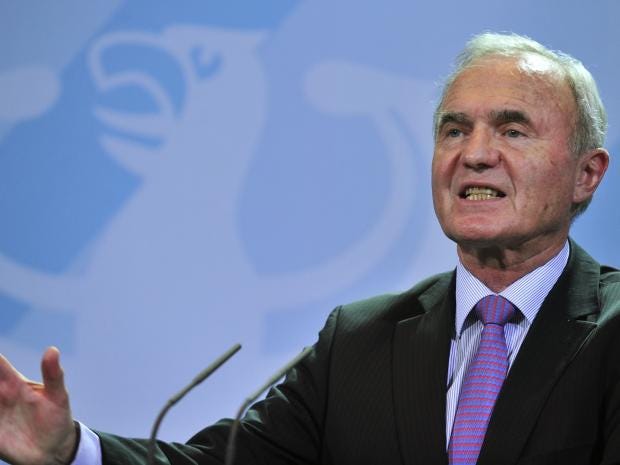 Professor Otmar Issing says the European Central Bank betrayed the principles of the currency project by bailing Greece out in 2008
Professor Otmar Issing says the European Central Bank betrayed the principles of the currency project by bailing Greece out in 2008
Professor Issing says Greece should have been allowed to crash out of the Euro and readopt the drachma AFP/Getty Images
The Euro currency project is unworkable in its current form and at the risk of “collapse”, its principal architect has warned.
Professor Otmar Issing, the European Central Bank’s first chief economist who helped create the single currency at the turn of the century, has warned that the Euro cannot survive in its current form.
He said the ECB had become dangerously overextended as it tries to manage the 19 economies using the single currency.
Speaking to trade journal, Central Banking, he said: “One day, the house of cards will collapse”.
He said the experiment with a single currency went from the moment it was introduced in 2002 and said it had been betrayed by the politics of the region.
“Realistically, it will be a case of muddling through, struggling from one crisis to the next. It is difficult to forecast how long this will continue for, but it cannot go on endlessly", he explained.
He believed that the ECB had made a fatal error in agreeing to bailout bankrupt states like Greece and Ireland.
He said: “The Stability and Growth Pact has more or less failed. Market discipline is done away with by ECB interventions.
“So there is no fiscal control mechanism from markets or politics. This has all the elements to bring disaster for monetary union.”
Prof Issing said there is no escape from the currency union’s problems without a political union which is unlikely to happen.
Leave voter who wants to 'control our own laws' can't name single EU law
He also condemned the first Greek bailout in 2008 as a bailout for French and German banks who had loaned to them.
He said it would have been better to force Greece out of the Euro and offer them generous support after they had restored their exchange rate stability on the drachma.
In 2015, Greece finally agreed a third bailout deal with the troika – the ECB, the European Commission and the International Monetary Fund – after a prolonged stand-off between the ruling party, Syriza, and the country’s creditors.
The left wing party attempted to negotiate more favourable terms after it was voted into office to fight the harsh austerity policies the troika asked for leading to the country running out of cash.
No comments:
Post a Comment